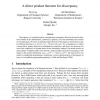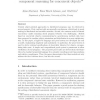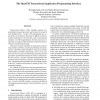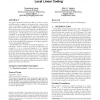506 search results - page 62 / 102 » Distributing synchronous programs using bounded queues |
144
click to vote
COCO
2008
Springer
15 years 4 months ago
2008
Springer
Discrepancy is a versatile bound in communication complexity which can be used to show lower bounds in the distributional, randomized, quantum, and even unbounded error models of ...
131
click to vote
ENTCS
2008
15 years 2 months ago
2008
Current object-oriented approaches to distributed programs may be criticized in several respects. First, method calls are generally synchronous, which leads to much waiting in dis...
118
click to vote
SPAA
1995
ACM
15 years 6 months ago
1995
ACM
Many high-level parallel programming languages allow for fine-grained parallelism. As in the popular work-time framework for parallel algorithm design, programs written in such lan...
116
Voted
IEEEPACT
2007
IEEE
15 years 8 months ago
2007
IEEE
Transactional Memory (TM) simplifies parallel programming by supporting atomic and isolated execution of user-identified tasks. To date, TM programming has required the use of l...
177
Voted
PODC
2012
ACM
13 years 5 months ago
2012
ACM
The goal of Byzantine Broadcast (BB) is to allow a set of fault-free nodes to agree on information that a source node wants to broadcast to them, in the presence of Byzantine faul...




